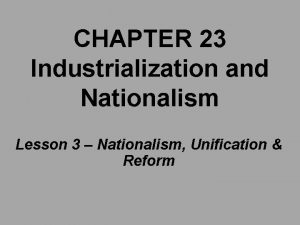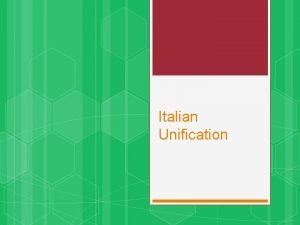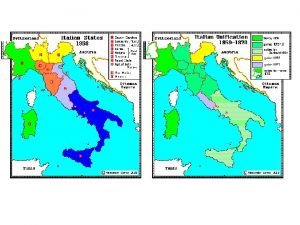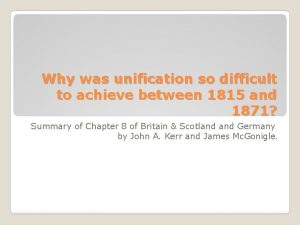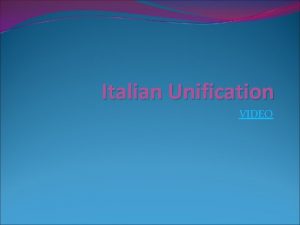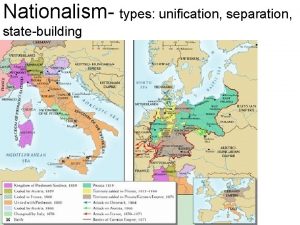The Effects of Nationalism Italian Unification Decisions at




- Slides: 4

The Effects of Nationalism

Italian Unification • • Decisions at the Congress of Vienna gave a lot of land in Italy back to the Austrians (they lost a lot of it when Napoleon beat them) Giuseppe Mazzini – Italian patriot who wanted to create an independent republic to bring the Italian people together – This created revolutionary cells across the peninsula • The Kingdom of Sardinia was able to take back control of Pidemont, Nice, Savoy, and Genoa – Sardinia becomes the most powerful Italian city-state – This makes it seem like the perfect leader for unification (at least according to the middle class) • Sardinia’s king, Victor Emmanuel II, named Camillo di Cavour the prime minister and allowed him to set about expanding Sardinia’s power – Convinced the French emperor, Napoleon III, to help drive the Austrians out of Northern Italy – This solidified control of N. Italy in the hands of Sardinia • While this was going on in the North, there was another movement that was taking place in the South, specifically in Sicily – Giuseppe Garibaldi started a movement known as the Risorgimento which he used as he was moving through Sicily and onto the mainland – He was being helped by Cavour in the North and made an agreement to hand over the S to Victor Emmanuel, which he did in 1861 • This united the majority of the country but it was not until the areas of Umbria, Marches , Venice, and Rome were finally captured that Italy was completely united – Rome was delivered to Victor Emmanuel in 1870 after a vote by the Roman people to join the rest of Italy – July 1871 – Rome became the capital of a united Italy

German Unification • • Controlled by Austrian Empire Prussia leads unification – Mainly a German population – Prussian’s army was the most powerful in Europe • Otto von Bismarck – Junkers – wealthy land-owning class – Realpolitik – “the politics of reality” • Making decisions based on what is best for the country without regard for what else was happening – Ruled without the consent of parliament and without a legal budget • “Blood and Iron” • 1863 – Polish Revolt – Bismarck realized that the Russians would put down the Polish Revolt and so he agreed to help the Russians – The revolt was put down and Bismarck secured his Eastern border • 1864 – Prussia forms an alliance with Austria to gain control of land on their border – Then Bismarck picked the Seven Weeks’ War by playing up agitation on the border • Prussians destroyed the Austrians and gained control of N. German territory • 1867 – the remaining sates of the N joined the Confederation • 1867 – Franco-Prussian War – Bismarck created an incident to gain his ends – French declared war and the Prussians beat them badly – Final stage in German unification because southern Germany gave into the nationalism and joined with the north • Wilhelm I is named the kaiser

Empires Crumble • As these nationalist ideas expanded and nation-states were created, the multi-cultural empires of the time were having more issues keeping everything together – Ottoman Empire lost Greece in 1830 and continued to lose land through the 1850 s until World War I • Lost Egypt and the Sudan to Britain in 1882 • Lost control of the wider areas of the empire at the same time – Austria Empire lost control of the German Confederation when Prussia defeated them in the Austro-Prussian War • Had to split the Austrian Empire in to the Austro-Hungarian empire after the Hungarians threatened to break away from the Austrians unless they got some kind of ruling power • This is going to make other minority groups pretty mad • It would break into multiple city-states in the next 40 years

